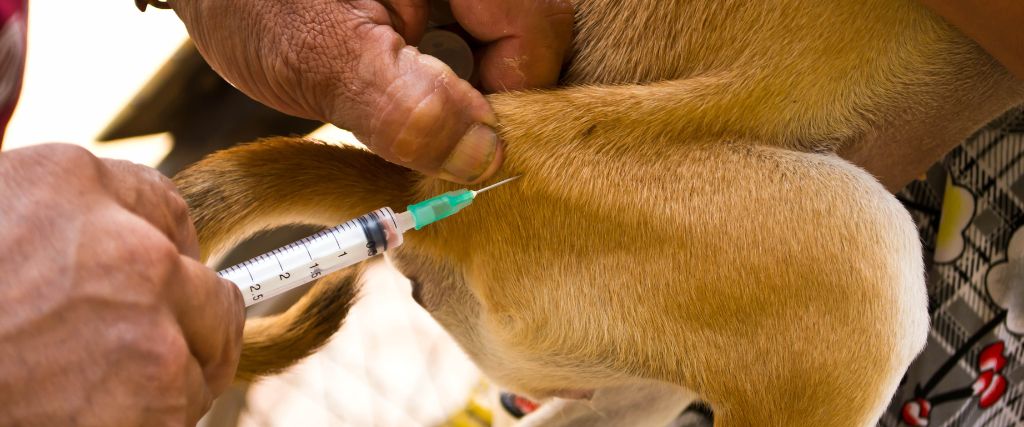If you frequently travel with your dog in and out the United States, then you’ll need to be prepared for the latest federal importation regulations for dogs entering and reentering the country. The new set of regulations, set forth by the Centers for Disease Control and Prevention (CDC), went into effect on August 1, 2024 and offer new guidance on what pet owners need to do when bringing a dog into the U.S.
These updates are part of the CDC's ongoing efforts to prevent the reintroduction of dog rabies into the U.S., ensuring the safety of both pets and people, so they’re incredibly important for pet owners to be up to date on.

Understanding the New Requirements
The steps you'll need to follow for bringing a dog into the U.S. depend on where your dog has been in the past six months. As a part of the CDC’s efforts to reduce further introduction of rabies to people and animals in the United States, they have identified over 100 countries that are considered high-risk areas for rabies exposure. If your dog has traveled to any of the high-risk areas identified by the CDC, you’ll need to take a few extra steps to ensure your dog is healthy and well-documented before you can both enter the country.
The CDC has simplified the process for dogs arriving from dog rabies-free or low-risk countries, but there are still important details to keep in mind. We’ll go over everything that is required for both cases of bringing dogs into the U.S.
Dogs from Dog Rabies-Free or Low-Risk Countries
If your dog has been in dog rabies-free or low-risk countries for the past six months, the process is straightforward. You'll need to complete the CDC Dog Import Form online. This form is the only requirement, and should only take just a few minutes to fill out. Once submitted, you'll receive a receipt that is valid for six months.
- Multiple Entries: The receipt can be used for multiple entries into the U.S. as long as your dog hasn’t traveled to a high-risk country within the last six months.
- Form Validity: If your dog travels frequently between the U.S. and another low-risk country, like Canada, the same form can be used multiple times until the receipt expires. However, if your dog visits a different country within that time, you’ll need to complete a new form.
- Health and Age Requirements: Your dog must appear healthy upon arrival, be at least six months old, and have a microchip that can be detected with a universal scanner.
Dogs from High-Risk Countries
If your dog has been in a high-risk country for rabies in the last six months, the process involves a bit more documentation to ensure it’s safe for them to reenter the country:
- CDC Dog Import Form Receipt: As with dogs from low-risk countries, you'll need to complete the CDC Dog Import Form.
- Certification of U.S.-Issued Rabies Vaccination or USDA-Endorsed Health Certificate: This form must be filled out by a USDA-accredited veterinarian and endorsed by the USDA.
In addition to these forms, your dog must meet the other requirements of entry, including being healthy, at least six months old, and microchipped before receiving their rabies vaccine. Don’t forget; the microchip number must be included on all required forms in order to be valid.
What If Your Dog Isn’t Vaccinated?
If your dog has been in a high-risk country and is not vaccinated against rabies, they will not be allowed to enter the United States. This strict rule underscores the CDC’s commitment to preventing the spread of rabies.
When it comes to vaccines, the rabies vaccine is one of the most important. There should never be an instance where your dog is left unvaccinated. Vaccinating against rabies is important not only for your dog’s health and safety, but also the health and safety of every other human and animal they come into contact with.

Compliance with Additional Regulations
In addition to the CDC requirements, you must also comply with the U.S. Department of Agriculture’s (USDA) and your U.S. destination's regulations. Be aware that dogs imported for commercial purposes, such as resale, have additional USDA requirements that you’ll need to meet outside of those set forth by the CDC.
United States Dog Importation Checklist
In accordance with the new CDC regulations for dog importation, as of August 1, 2024, all dogs entering the United States must:
- Appear healthy upon arrival
- Be at least six months of age
- Be microchipped
- Be accompanied by a CDC Dog Import Form online submission receipt
Frequently Asked Questions About Bringing a Dog into the United States
What Documents Do I Need to Bring My Dog Into the USA?
To bring your dog into the USA, you'll need the following documents:
- Rabies Vaccination Certificate: Your dog must have a valid rabies vaccination certificate. This certificate must be issued by a licensed veterinarian and include details such as the date of vaccination, vaccine manufacturer, and vaccine lot number.
- Health Certificate: Some airlines and states require a health certificate, which is issued by a veterinarian within a certain number of days before travel. This document confirms your dog is healthy and fit to travel.
- CDC Dog Import Permit: If your dog is coming from a high-risk country for rabies, you'll need a CDC Dog Import Permit.
- Microchip Information: Dogs coming from high-risk countries must be microchipped, and the microchip number must be included on the rabies vaccination certificate.
What Is a CDC Dog Import Permit?
A CDC Dog Import Permit is a special authorization issued by the Centers for Disease Control and Prevention that allows you to bring a dog into the United States from a country considered high-risk for rabies. This permit is necessary to ensure that all dogs entering the U.S. are free from rabies, helping to prevent the disease's reintroduction.
Where Can I Find the CDC Dog Import Form?
The CDC Dog Import Form, which you’ll need to apply for a Dog Import Permit, can be found on the CDC’s official website. The application process is done online, and you should submit it at least 30 business days before you plan to travel to ensure it’s processed in time.
How Can I Bring My Dog Into the United States?
To bring your dog into the United States:
- Determine the Rabies Risk Level: First, find out if your country is considered high-risk, low-risk, or rabies-free.
- Meet Vaccination Requirements: Ensure your dog is up-to-date on rabies vaccinations. Dogs from high-risk countries must also have a rabies titer test done at an approved laboratory.
- Obtain Necessary Documents: Gather all required documentation, including a rabies vaccination certificate, health certificate, and, if applicable, a CDC Dog Import Permit.
- Book Your Travel: If you’re traveling by air, contact your airline to confirm their pet travel policies and ensure your dog meets their requirements.
- Entry at U.S. Ports: Upon arrival, present your documents to the U.S. Customs and Border Protection (CBP) officers. Dogs from high-risk countries will be inspected, and if they don't meet the requirements, they may be denied entry or quarantined. There may be additional restrictions based on how you choose to travel with your dog; be sure to double check what points of entry you can utilize before booking your trip.
Is there a Limit on Bringing Dogs Into the United States?
There is no specific limit on the number of dogs you can bring into the United States. However, each dog must meet all CDC requirements, and you must have all the necessary documents for each dog. Additionally, if you plan to import more than five dogs from a high-risk country, you must enter the U.S. at a port of entry with a live animal care facility.
Wrapping Up the Latest CDC Dog Importation Regulations
The new regulations emphasize the importance of safeguarding public health by preventing the reintroduction of dog rabies into the United States. Whether your dog is traveling from a low-risk or high-risk country, following these steps will ensure a smooth entry into the U.S.
For pet owners, staying informed and prepared is key. Make sure to complete all necessary forms, adhere to vaccination requirements, and keep your dog’s health documentation up to date. By doing so, you’ll help protect your pet, your family, and the wider community.
If you have questions and you'd like to reach out to us, you can call us directly at (310) 679-9522, or you can email us at [email protected]. Don't forget to follow us on social media Facebook, Instagram.
